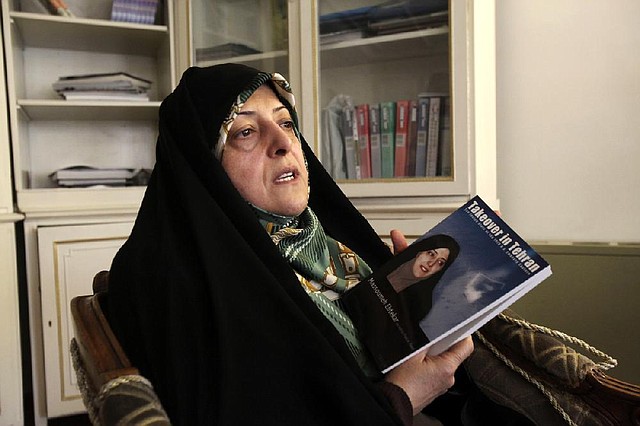Hostage takers’ spokesman joins Iran Cabinet
Masoomeh Ebtekar, shown here Feb. 14, was the main spokesman for the hostage takers during the 444-day standoff at the U.S. Embassy in Tehran, Iran.
Wednesday, September 11, 2013
TEHRAN, Iran - Iran’s president has named as vice president a hard-liner-turned-reformer who was spokesman for the hostage takers at the U.S. Embassy after the 1979 Islamic Revolution, an adviser said.
The selection of Masoomeh Ebtekar as vice president for environmental affairs underscores how many staunch backers of the overthrow of Iran’s Western-backed monarchy more than 30 years ago now side with moderates.
Their stance includes the belief that the ruling clerics have become too oriented toward battling the West and need to adopt more international outreach in a globalized world. Such figures as opposition leaders Mir Hossein Mousavi and Mahdi Karroubi - both under house arrest since early 2011 - were strong supporters of the Islamic Revolution before pushing for change.
Ebtekar, 52, is fluent in English from her years living in the U.S. as a schoolgirl in Philadelphia and Massachusetts in 1963-69 when her father was studying in the United States.
She was a main spokesman during the 444-day hostage standoff in Tehran, and was referred to as “Mary” by the foreign media. She made frequent appearances on American television as a translator for the hostage takers, who held 52 captives until January 1981. She later married Mohammad Hashemi, one of the militant students reportedly involved in the embassy takeover.
In interviews, Ebtekar has defended the embassy assault in the context of the revolution’s fervor and Iran’s historical grievances against Washington for backing a coup in 1953 that toppled a democratically elected government and reinstalled the pro-Western shah.
She also dismissed as “superficial” last year’s American film Argo, about a secret plan to rescue Americans who slipped out of the embassy compound after it was stormed.
Ebtekar, who has a doctorate in immunology, was Iran’s first woman vice president under reformist President Mohammad Khatami from 1997 to 2005. She later served on the Tehran Municipal Council and became a respected scholar in environmental studies.
During her work on the council, her comments opposing rules requiring women to wear the Islamic veil in Iran prompted hard-liners to criticize her. Ebtekar herself wears a full, head-to-toe veil.
A mother of two, she is the second woman on the panel of vice presidents picked by President Hasan Rouhani.
In August, Rouhani appointed another woman, Elham Aminzadeh, to his Cabinet as his vice president in charge of legal affairs. Rouhani had promised a greater role for women during his presidential campaign.
Ebtekar also has a long history of working as a cultural figure. In 1981, Khatami selected her as editor-in-chief of the state-run English daily newspaper Kayhan International, where she served until 1983.
In 1991, she co-founded the Institute for Women’s Studies and Research. Since 1992, she has been the license holder and managing director of the Farzaneh Journal for Women’s Studies and Research.
Ebtekar also led women’s rights nongovernmental organization delegations abroad and was elected president of Iran’s Network of Women’s NGOs.
In 2006, the United Nations Environment Program named her one of seven Champions of the Earth, calling her a prominent and “inspirational” environmental leader who has made a regional impact at the policy level.
Front Section, Pages 9 on 09/11/2013
